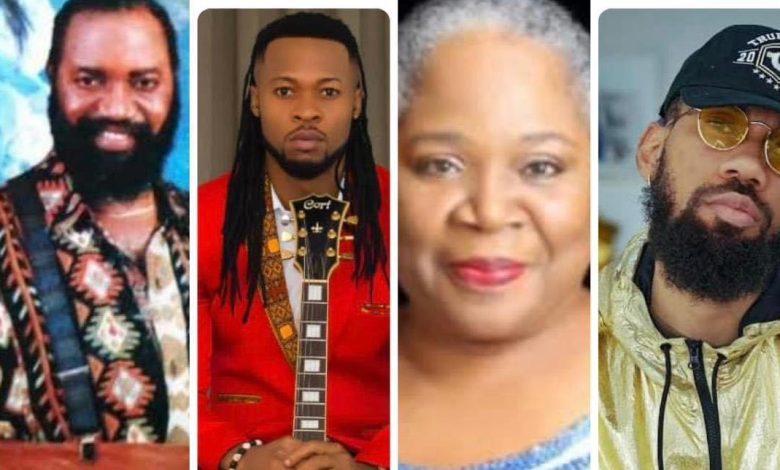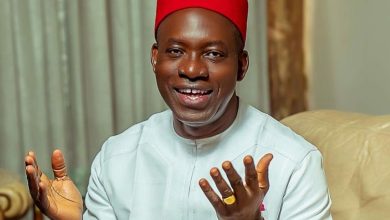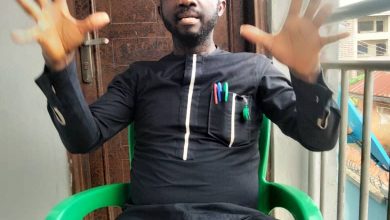
By Uche Nworah, Ph.D
I came across a write-up with the above caption on the Internet by an anonymous writer. In the write-up, the author tried but unsuccessfully to blame Ndigbo for the fate of Igbo musicians who have not been able to push their craft onto the global stage. According to the author; “I have always insisted that what praise singing and money worshipping highlife nkwa did to the psyche of the average Igbo musically is best called a tragedy. This singular musical taste corruption is why most Igbo musicians find it hard to hit the international markets”.
I totally disagree with the unfortunate assertion and conclusion drawn there from. We should please not promote this type of self-hating diatribe. The writer is talking bollocks. I am not in the music business but I am old enough to know that the Joe Nez, Onyeka Onwenu and Nelly Uchendu era the writer mentioned are way different from the music industry of today, which is driven by music revenue digitization, music rights and music catalogue earnings.
I grew up in Aba, and can tell the reader about the pioneering efforts of indigenous Igbo-owned record labels in the 70s and 80s to promote music of Igbo and other genres. Back then, before Alaba International market became the centre of music and Nollywood content distribution in Nigeria, and before online streaming platforms berthed, Pound road and Park road, Aba, and Iweka road, Onitsha, were the headquarters of music and film content distribution in Nigeria.
Despite the activities of big music labels at the time, that were based mainly in Lagos, such as EMI, Phonodisk, Decca Records, Premier Music, Polydor, Polygram etc, I recall the giant efforts of indigenous record labels such as Anodisc in Aba, Right Time Records and Tabansi Records in Onitsha. There was also Rogers Allstars in Onitsha which later relocated to remote Umuokpu-Awka. The record label made Bright Chimezie the star that he later became. It also had on its books other artistes including Ikenga Superstars of Africa, Goddy Ezike & Black Brothers, Prince Nico Mbarga, Okukuseku International Band of Ghana, and Canadoes Super Stars Band Of Ghana.
Music producers and record labels give to the market what the market requires. Recall that post Nigeria/Biafra civil war, the South East was almost decimated. Men lost their businesses and fortune, and were given only 20 pounds by the Nigerian government to start life all over. The mood of that era was low and required music that will lift-up the spirits of the people. On this subject, Dr. Kalu Ndubuisi of Chukwuemeka Odumegwu Ojukwu University (COOU) agrees. He wrote; “Eddy Nkwansa bia ooo bia ooo… Eddy Nkwansa bia ooo bia ooo… Izu ka nma na nneji ooo, bia ooo bia ooo. That was the music band Peacocks calling on those who left Aba (Enyimba City), and ran to other African countries because of the war to come back home because things have normalized. He mentioned Mike Merchandise from Enugwu-Ukwu, the electronic dealer. John Anyaehie …Anyaehie Toyota crown. He used them in the song to stimulate and encourage others to come back home from exile. Though I was born years after the war, but I listened to these musicians to learn more about our people”.
It is instructive that NTA Channel 6 Aba used this song as theme song for its very successful long running television series, ‘Masquerade’, which was later syndicated on national TV. The 1970s post-Biafra war production featured acting greats such as Chika Okpala who played the role of Zebrudaya, late Christiana Essien -Igbokwe who played the role of Akpeno, Jegede Sokoya’s wife, James Iroha (Gringory), Davis Ofor (Clarus) and others.
The experience of the civil war, and the need to increase the morale of Ndigbo was also the reason why football clubs such as Enyimba International Football Club, and Rangers International Football Club sprang up and received massive following from South Easterners. Anytime they played teams from the North and West, in the psyche of the people, it was a controlled Nigeria/Biafra war all over again.
It was at this time also that Ndigbo rallied themselves post-Nigeria/Biafra war and set up social clubs such as People’s Club, Nwanne Di Na Mba Social Club, Paradise Social Club, Anaedo Social Club etc. These were majorly networking social clubs, which provided the members an opportunity to socialize and have fun, having survived the pogrom. That era witnessed the popularization of sayings such as; ‘Okpa aku eri eri, lekwa otu onu di ndi nwuru anwu’, ‘Ka anyi bili be ndu, anyi bisia ndu anyi amalu ife anyi ga eme echi’, and so on.
Some of the musicians of that era, not all, took to praise singing to showcase successful Igbo people in order to inspire and motivate others. South-Easterners were living different realities compared to those living in Northern and Western Nigeria. Over time, such praise singing music which resonated with the people stuck with the people. Late highlife maestro Oliver De Coque latched onto the mood of that era and released his ‘Ana enwe obodo enwe’ song, he followed it up with the ‘Nnukwu mmonwu’ song. Perhaps, it was the success of the two songs amongst Ndigbo that may have given rise to the false notion that Ndigbo only love such ‘iti mkpu’ music.
That is untrue because long before then, we had Igbo artistes that were fairly successful nationally who did not sing ‘iti mkpu’ songs. The likes of Oby Onyioha, Chris Okotie, Jide Obi, Onyeka Onwenu, Nelly Uchendu, Chris Mba, Mike Ejeagha, Late Chief Stephen Osita Osadebe and others. They sang love ballads and highlife music as well.
We should not blame our people for liking praise singing music. Ndigbo are not the only people who sing or like praise singing music. The Yorubas do as well. Have you ever attended a concert by Sunny Ade, Ebenezer Obey, Pasuma or Wasiu Ayinde Marshall (KWAM 1)? What do they do in the concerts? The musicians take turns in singing the praises of some of the guests present. The guests take turns in planting bundles of currencies on the faces of the musicians.
Ndigbo still appreciate other Igbo music genres. Remember Sir Warrior and his Oriental Brothers International, The Peacocks Band and the rest. Were they also praise singers? How about Onyeka Onwenu and Nelly Uchendu?
The writer got it all wrong by his assertion that Onyeka Onwenu could have ‘blown’ as a bigger artiste if she wasn’t Igbo. I recall that as a young man in the 80s, Onyeka was the biggest thing in the South East. I attended many of her concerts at Crystal Park Hotel, Aba. Even Nelly Uchendu was quite big during our secondary school days at CIC, Enugu. Jim Nwobodo who was the Governor of old Anambra state did invite her to play regularly at state functions and we did attend several of her concerts.
There is no need for the writer to assert that Ndigbo don’t quite appreciate Phyno, Flavour and others, and do not book them for events. I don’t know how many Igbo events the author attends to come to such unfair conclusion. Just this January 2023 alone, I attended two Igbo weddings in Lagos where Flavour played.
That Phyno, Flavour and other Igbo musicians have not ‘blown’ internationally like Burna Boy, Davido, Whizkid and others have, could be as a result of other factors, but definitely, not because Ndigbo love only praise singing music and do not support Igbo artistes. In a different conversation with some friends, I had argued that this perhaps maybe down to management -related issues, and perhaps, lack of understanding of the global music business structure, by the Igbo artistes and their handlers.
These I believe should have been areas for the writer to discuss and not the self-hating conjectures he made in his unfortunate write-up.
In concluding, one may wish to ask who the writer is to judge Igbo artistes and their successes. Is there a universal notion of success in the music business? Does such conflict with the concept of ‘self satisfaction’? Satisfaction with oneself and one’s current career status, and not succumbing to the urge to accept to be judged by other people’s measure and standard of success? Have Phyno, Flavour, Pato Ranking, Runtown, Psquare, Kcee and other Igbo artistes complained to him?
uchenworah@yahoo.com




